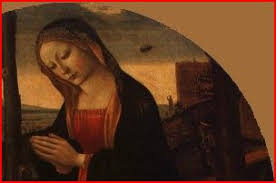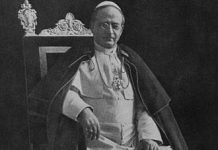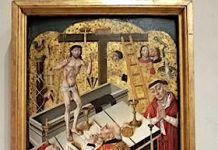My mother’s sons were angry with me,
they made me keeper of the vineyards,
but my own vineyard I have not kept. (Song 1:6)
For many of us, 2020 has been a year of blight and suffering. Everywhere we turn, we are constantly reminded of rising death tolls, job losses, illness and the threat of contamination. We look with nostalgia and longing on those years when we were able to move about freely and gather together for festive occasions. We cannot help but wonder, “Will this Christmas season be filled with more lament, regret and dread than good cheer and jubilation?”
Our Lord was also born during a time of affliction, dread and despair. At that time Herod, an immoral and sadistic king, ruled over Judea,[1] while the house of David lay in ruins. St. Joseph, himself a descendant of David,[2] worked as a humble carpenter, living such a simple life that when our infant Lord was presented at the Temple, His parents did not even have the means to purchase a year-old lamb for the burnt offering; instead, they were only able to offer a sacrifice of doves or pigeons.[3]
It was a time of such darkness that even the righteous started to doubt and live a life of quiet desperation. They still said their prayers and fulfilled all their religious obligations, but their hearts slowly lost that heavenly capacity for joy and anticipated glory. Such was the case with the priest Zechariah, whom St. Luke described as “upright in the sight of God, observing all the Lord’s commands and regulations blamelessly.”[4] And yet, when the angel Gabriel told him that his prayers had been heard,[5] he refused to believe the good news,[6] wondering in disbelief, “How can I be sure of this?”[7]
The Blessed Virgin, however, was different. The reason all generations call her blessed was not simply because God had done great things for her,[8] but also because she “believed that what the Lord had said to her would be accomplished.”[9] Despite living in a time of darkness and death,[10] she had prepared a highway in her heart for the Lord—a “garden enclosed,” filled with the choicest fruits of faith, hope and virtue,[11] ready to joyfully receive and nurture the Seed of the Redeemer.
We, too, as her children and the children of the Church, have been “born again, not of perishable seed, but of imperishable, through the living and enduring word of God.”[12] This pandemic has painfully shown us that all fallen seed is perishable, doomed to death and destruction. The cells that make up our earthly bodies are prone to mutation, and so are the viruses that inhabit the air. Out of these mutations come destructive cancers and new, pernicious viruses like Covid-19. Our hearts and minds are also fallen and vulnerable to sins, vices and various afflictions. In our fallen world, the infant can never play near the cobra’s den, nor the young child frolic in the viper’s nest.[13] The seeds of death and destruction are inscribed into the genes of mother earth. But in keeping with God’s promise “we are looking forward to a new heaven and a new earth, the home of righteousness.”[14]
“My mother’s sons were angry with me,” the bride of the Song of Songs complained, “they made me keeper of the vineyards, but my own vineyard I have not kept.”[15] Many of us, anxious to win good livelihoods and the good pleasure of those around us, have been busy tending the fallen vineyards of this world while neglecting the heavenly vineyard that the Lord has prepared for us. “You did not choose me,” our Lord once proclaimed, “I chose you and appointed you to go and bear fruit—fruit that will last.”[16] The imperishable seed that we have been born of, if properly nurtured, shall bear forth the choicest fruits that will last unto all eternity.
“Christ must be born from every soul, formed in every life,” popular Catholic writer and mystic Caryll Houselander once wrote:
The one thing that [the Blessed Virgin] did and does is the one thing that we all have to do, namely, to bear Christ into the world. … If we had a picture of Our Lady’s personality we might be dazzled into thinking that only one sort of person could form Christ in himself, and we should miss the meaning of our own being.[17]
This Christmas season, let us adopt a Marian attitude. All of us live in the desert of this world, with its scorching heat of pressing anxieties and uncertainties. Like Zechariah and the Blessed Virgin, we too live “in darkness and in the shadow of death.”[18] Let us not fix our eyes on the passing darkness, however. The Light of the world has come, bringing with Him the seeds of eternity and glory. Let us welcome Him into our hearts, and nurture the vineyards that He has entrusted to us. Let the light of our heavenly hope, faith and charity shine upon the barren deserts of this world, until the earth is “full of the knowledge of the Lord, as the waters cover the sea.”[19]
Amen. Come, O Emmanuel!
In that day the Root of Jesse will stand as a banner for the peoples;
the nations will rally to him, and His resting place will be glorious. (Is 11:10)
[1] Lk 1:5
[2] Lk 1:27
[3] Lev 12:6-8, Lk 2:22-24
[4] Lk 1:6
[5] Lk 1:13
[6] Lk 1:20
[7] Lk 1:18
[8] Lk 1:48-49
[9] Lk 1:45
[10] Cf. Lk 1:79
[11] Song 4:12-14, cf. Is 40:3-5
[12] 1 Pe 1:23
[13] Cf. Is 11:8
[14] 2 Pe 3:13
[15] Song 1:6
[16] Jn 15:16
[17] Houselander, Caryll. The Reed of God (p. 4). Ave Maria Press. Kindle Edition.
[18] Lk 1:79
[19] Mt 5:16, Is 11:9












